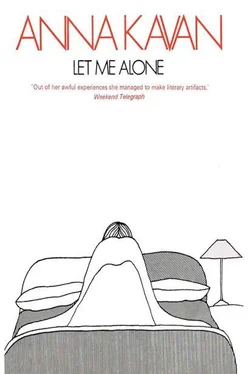ANNA KAVAN found an apt title for this novel, first published in 1930 under the name of Helen Ferguson. Let Me Alone is an account, from childhood, of isolation in a woman and of her compulsive retreat from any association, especially marriage, that might impinge upon the strange, austere loneliness and solitude she both wanted and mortally dreaded: a schizophrenic condition. She marries — the wrong man inevitably — with predictably disastrous consequences.
This 1930 novel brings to mind today’s Women’s Liberation movement, with its demands for independence of mind and spirit for women. ‘She wanted to go through life alone, in her own independent, detached fashion,’ the heroine meditates, before marrying. ‘The idea of being bound up with another person in such a relationship as marriage was hateful to her.’ After the marriage, she is reading a Life of Luther when ‘… from the midst of the printed page, there suddenly sprang out at her these words: “Here I stand; I can no other,” a great enlightenment came to her, a sudden illumination. In a moment everything was made plain to her…. How easy and simple to face life from the single basis of her own undeniable individuality. She was what she was: herself. No need for compromise or apology or modification or defence.’
All very well if one is content with isolation and able to encrust oneself with a satisfactory crab’s shell. The heroine of Let Me Alone makes her efforts to be absorbed in other people. But the three men in her life fail her — her father, her husband and the hesitant, would-be lover, Findlay. She falters towards lesbianism; one of the best scenes in the novel describes her hopeless return to the erstwhile devoted girl, Sidney, and Sidney’s acutely perceptive rejection of her.
A Brontë influence seems to pervade the early part of this novel: the sombre father might have been imagined by Charlotte or Emily. Later, more than a hint of the D. H. Lawrence of Women in Love pervades its language, with obsessional repetitions of certain key words. In the finely written last part, the identity of the future Anna Kavan emerges clearly, especially in the hallucinatory power of the great rainstorm in Burma, coinciding with the final collapse of the ill-starred marriage.
The name Helen Ferguson, used for the earlier novels, was to be discarded, and the author began to use that of Anna Kavan (the married name of the protagonist of Let Me Alone) for the later books by which she is better known. As I have related in my Introduction to her posthumous collection of stories, Julia and the Bazooka (Peter Owen, 1970), she adopted the latter name by deed poll, following two retreats to mental hospitals, after which she changed not only her name and mode of living but also, somewhat remarkably, her personal appearance. Her vitality remained unimpaired; even her daily recourse to heroin — for some thirty years — as an escape from her conflicts, did not bring drastic physical damage until her last year or so. There had been two failed marriages. She lived until she was 67, and did not cease writing novels and short stories. She achieved the isolation and independence she wanted, but not an impervious shell.
RHYS DAVIES
JAMES FORRESTER, the father of Anna-Marie, was a peculiar man. He belonged to the technical hierarchy of gentlemen. That is to say that he had received a lengthy and expensive education from which all utilitarian subjects had been carefully excluded; that he had been born into a class of people who spoke, ate, dressed and usually thought in the same prescribed manner, who were dominated by certain fixed ideas — chief among them being the conviction of their own intrinsic superiority — and who considered most activities, physical or intellectual, not only undesirable but disgusting.
But James was disquietingly untrue to type. He would not hunt with the pack: in fact, he would not hunt at all. He had ‘ideas.’
‘He’s picked them up at Cambridge,’ said his father, making excuses for his son’s damning departure from the gentlemanly intellectual norm. ‘He’ll grow out of them.’
Not that anyone knew what James’s ideas really were. He never spoke of them. Indeed, he had very little to say on any subject. He was a silent young man.
His father, who was proud of him, proud of his intellectual record at the university (though secretly a little disappointed that it was not a sporting one) tried to draw him out. But James would not be drawn. He was always perfectly polite to the old man, perfectly reserved and perfectly discouraging. His father began to lose heart in the face of his suave unapproachableness. Nevertheless, he tried perseveringly to interest his son in the estate, which was his own last absorbing passion. The young man courteously but firmly refused to be interested. When questioned and driven into an argumentative corner, he replied quietly that it struck him as slightly degrading that man — who after all was an independent thinking animal — should allow his whole life to be dominated by and devoted to his possessions.
His father then left him alone.
James was unsociable. He fled from the society of his father’s friends, whom he disliked, to the society of his inferiors, whom he disliked even more, and from whom in turn he fled to solitude. In spite of his habitual cold politeness, he was occasionally extremely rude to members of his own class, for whom he felt a curious blend of sympathy and contempt. He was essentially one of them; and he knew it. If he could not tolerate them, at least, most certainly, he could tolerate no one else; and if he despised them he despised himself also. He was at once an aristocrat and a revolutionary, the hater and the hated. An unfortunate combination.
People put up with his eccentricities remarkably well, partly on account of his prospective wealth and partly because of his appearance, which was rather distinguished. He was always the best-dressed person in the room.
When he was twenty-seven his father died, discouraged. Since he could do no more for him, he left his son a large fortune.
James’s first action was to sell the estate; an act that would have broken the old man’s heart. He then proceeded, with a certain methodical determination, to spend his father’s money. Eight years later he had practically succeeded, when he suddenly and incomprehensibly married a penniless girl of semi-Austrian parentage.
James Forester was now thirty-five years old and looked considerably older. He was tall and thin, with a cold, stern, grey face and smooth grey hair. He looked like a statesman. His manner was chilly, aloof, arrogant and repelling. He had no friends and he disliked everyone. He liked mountains, however; he was also fond of the sea and of the earth as a whole: ‘Where every prospect pleases, and every man is vile,’ as he sometimes mis-quoted.
Nevertheless, he was sufficiently attracted by Lise to marry her. It was almost a clandestine marriage. Lise’s Austrian mother did not approve of James. But she tolerated him because of his distinguished appearance and his reputed fortune, into which, being a lady of casual temperament, she did not trouble to inquire. In point of fact it was already practically non-existent.
The couple lived opulently enough upon credit until the birth of Anna-Marie some eighteen months later. Thereupon, Lise, conveniently, or perhaps inconveniently, died; and it became known that James was no longer a rich man.
He himself caused the news to be spread about Europe, where in the course of nine years’ extravagances he had achieved a considerable reputation. If anything, he exaggerated the rumours of his ruin. He was a moral extremist. If he could not be a Crœsus he would be a pauper. And he derived a certain ironic satisfaction from contemplating the complete dissipation of his father’s carefully nursed inheritance.
Читать дальше












